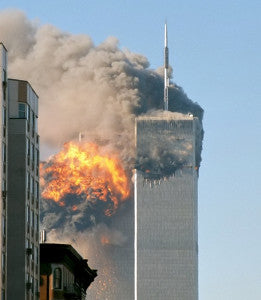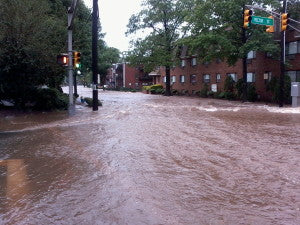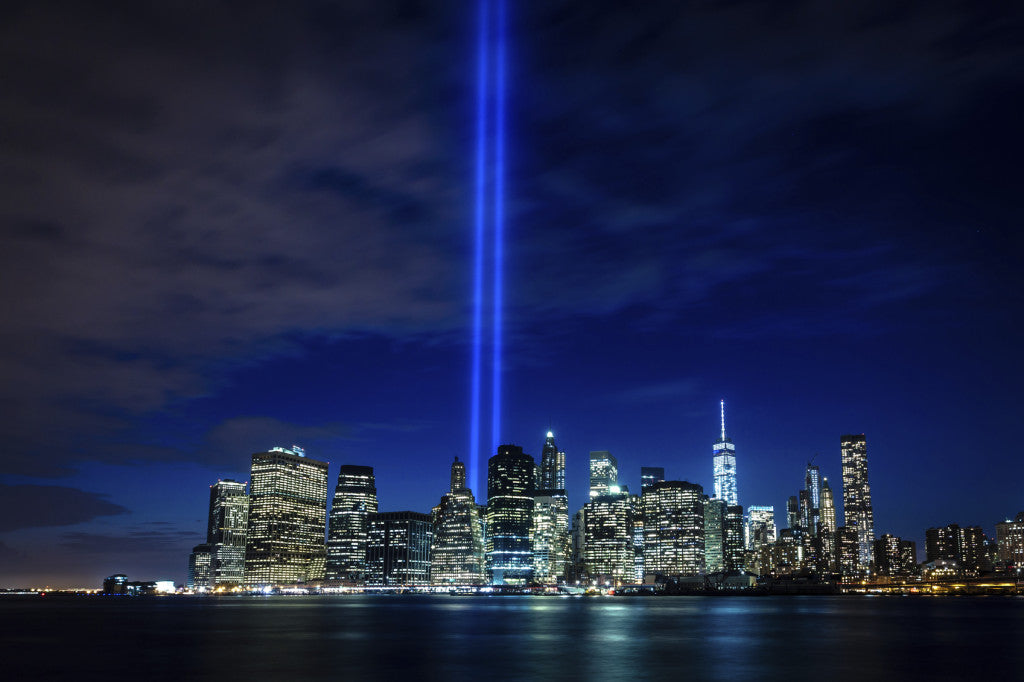A month before the September 11, 2001 attack, I snapped a photo in the restaurant atop World Trade Center 2. It was a sign by the elevator, indicating the floor we were on and a notice: “In case of fire, use stairs.”
I was there celebrating the end of an internship in the World Financial Center building directly across the street. My fellow intern and I found the sign hilarious. If something went wrong and we were that high, we agreed, there was no point in obeying. We’d be dead anyway.

A month later, I watched on TV from my new job in a rural U.S. Army base while planes hit both World Trade Center buildings.
I emailed my former employer. Everyone was fine. The company had an evacuation plan, and as soon as the first plane hit, all but essential personnel left and caught a ferry to the company’s New Jersey headquarters. Everyone made it safely out of the area, though the building sustained heavy damage. (I saw a picture. My former desk was covered in grime, and the windows were blown in.)
On the other hand, if a terrorist had attacked the rural base where I was on September 11, we could have been in trouble. The front gate had a toll booth-style guard building that was wide open. It might as well have been. Barbed wire fences marked the base’s perimeter in the sparse shrub and dirt wilderness. They kept cows out, but not much else. Admittedly, any attacker would have had to travel a long way to Replace anyone to attack.
When we left the base that day, we followed directions through a ditch, past the newly-closed gate and newly-armed guards. An enormous machine gun now pointed menacingly outward, except … it was mounted on what looked like a folding card table. My absurd mental image of what would have happened if they’d fired it was the one funny part of a terrible day.
That day, an emergency plan protected my former coworkers. At my new job, well, we were remote.
September is National Preparedness Month. This, in conjunction with the fifteenth anniversary of 9/11, is a great time to remember why to be prepared.
The Federal Emergency Management Agency
gives two reasons to be prepared.
First, “being prepared can reduce fear, anxiety, and losses that accompany disasters,”
a FEMA brochure said.
[caption id="attachment_21007" align="alignright" width="300"]

Flooding from Hurricane Irene[/caption]
A study by Rice University educators showed that people who prepared for Hurricane Ike, which hit Houston in 2008, were calmer and less likely to evacuate in advance of the storm. Those who lived outside the recommended evacuation zone stayed off the road, allowing those at greater risk to leave more quickly and reducing auto accidents, the study’s authors wrote.
For older adults, families with young children and people with special needs, preparation is vital to survival. More than half the people who died in Hurricane Katrina were age 65 and older,
according to a New York Times story about disaster preparedness for older people.
“They can’t get out of harm’s way fast enough,” Jenny Campbell, a nonprofit consultant who deals with age-related issues
told the New York Times. “And sometimes they may not even have a way to flee. Or they may lack a larger social system, and so they may not be warned in time.”
Second, being prepared reduces the destruction from disasters,
according to FEMA. The Rice University study called this type of preparedness hazard mitigation.
Hazard mitigation includes trimming branches and making repairs before a disaster to reduce damage. It also means making copies of important documents. Helene Dressendofer was in her late 70s when Hurricane Sandy destroyed her home in 2012, according to the
New York Times. Her documents were stored in cardboard folders and were destroyed. As of January 2016,
she was still waiting for insurance reimbursement.
She recommended scanning photographs, making a list of possessions and putting the list and other important documents in sealed waterproof boxes,
according to the story.
FEMA provides a free, 204-page, step-by-step guide to help individuals and families prepare for many types of disasters, called
Are You Ready.
When I returned to the military base several days after September 11, it was transformed. My carpool van had to zigzag through concrete barriers to enter, and U.S. Army soldiers scrutinized identification of every person in the vehicle. When I went out jogging, I passed new sentry boxes and soldiers on patrol in the scrub. It was comforting in a way.
Being prepared provides peace of mind. And it may save your property and life. On September 11, 2001, one of my employers was ready. The other was lucky. Which would you rather be?

 A month later, I watched on TV from my new job in a rural U.S. Army base while planes hit both World Trade Center buildings.
I emailed my former employer. Everyone was fine. The company had an evacuation plan, and as soon as the first plane hit, all but essential personnel left and caught a ferry to the company’s New Jersey headquarters. Everyone made it safely out of the area, though the building sustained heavy damage. (I saw a picture. My former desk was covered in grime, and the windows were blown in.)
On the other hand, if a terrorist had attacked the rural base where I was on September 11, we could have been in trouble. The front gate had a toll booth-style guard building that was wide open. It might as well have been. Barbed wire fences marked the base’s perimeter in the sparse shrub and dirt wilderness. They kept cows out, but not much else. Admittedly, any attacker would have had to travel a long way to Replace anyone to attack.
When we left the base that day, we followed directions through a ditch, past the newly-closed gate and newly-armed guards. An enormous machine gun now pointed menacingly outward, except … it was mounted on what looked like a folding card table. My absurd mental image of what would have happened if they’d fired it was the one funny part of a terrible day.
That day, an emergency plan protected my former coworkers. At my new job, well, we were remote.
September is National Preparedness Month. This, in conjunction with the fifteenth anniversary of 9/11, is a great time to remember why to be prepared.
The Federal Emergency Management Agency gives two reasons to be prepared.
First, “being prepared can reduce fear, anxiety, and losses that accompany disasters,” a FEMA brochure said.
[caption id="attachment_21007" align="alignright" width="300"]
A month later, I watched on TV from my new job in a rural U.S. Army base while planes hit both World Trade Center buildings.
I emailed my former employer. Everyone was fine. The company had an evacuation plan, and as soon as the first plane hit, all but essential personnel left and caught a ferry to the company’s New Jersey headquarters. Everyone made it safely out of the area, though the building sustained heavy damage. (I saw a picture. My former desk was covered in grime, and the windows were blown in.)
On the other hand, if a terrorist had attacked the rural base where I was on September 11, we could have been in trouble. The front gate had a toll booth-style guard building that was wide open. It might as well have been. Barbed wire fences marked the base’s perimeter in the sparse shrub and dirt wilderness. They kept cows out, but not much else. Admittedly, any attacker would have had to travel a long way to Replace anyone to attack.
When we left the base that day, we followed directions through a ditch, past the newly-closed gate and newly-armed guards. An enormous machine gun now pointed menacingly outward, except … it was mounted on what looked like a folding card table. My absurd mental image of what would have happened if they’d fired it was the one funny part of a terrible day.
That day, an emergency plan protected my former coworkers. At my new job, well, we were remote.
September is National Preparedness Month. This, in conjunction with the fifteenth anniversary of 9/11, is a great time to remember why to be prepared.
The Federal Emergency Management Agency gives two reasons to be prepared.
First, “being prepared can reduce fear, anxiety, and losses that accompany disasters,” a FEMA brochure said.
[caption id="attachment_21007" align="alignright" width="300"] Flooding from Hurricane Irene[/caption]
A study by Rice University educators showed that people who prepared for Hurricane Ike, which hit Houston in 2008, were calmer and less likely to evacuate in advance of the storm. Those who lived outside the recommended evacuation zone stayed off the road, allowing those at greater risk to leave more quickly and reducing auto accidents, the study’s authors wrote.
For older adults, families with young children and people with special needs, preparation is vital to survival. More than half the people who died in Hurricane Katrina were age 65 and older, according to a New York Times story about disaster preparedness for older people.
“They can’t get out of harm’s way fast enough,” Jenny Campbell, a nonprofit consultant who deals with age-related issues told the New York Times. “And sometimes they may not even have a way to flee. Or they may lack a larger social system, and so they may not be warned in time.”
Second, being prepared reduces the destruction from disasters, according to FEMA. The Rice University study called this type of preparedness hazard mitigation.
Hazard mitigation includes trimming branches and making repairs before a disaster to reduce damage. It also means making copies of important documents. Helene Dressendofer was in her late 70s when Hurricane Sandy destroyed her home in 2012, according to the New York Times. Her documents were stored in cardboard folders and were destroyed. As of January 2016, she was still waiting for insurance reimbursement.
She recommended scanning photographs, making a list of possessions and putting the list and other important documents in sealed waterproof boxes, according to the story.
FEMA provides a free, 204-page, step-by-step guide to help individuals and families prepare for many types of disasters, called Are You Ready.
When I returned to the military base several days after September 11, it was transformed. My carpool van had to zigzag through concrete barriers to enter, and U.S. Army soldiers scrutinized identification of every person in the vehicle. When I went out jogging, I passed new sentry boxes and soldiers on patrol in the scrub. It was comforting in a way.
Being prepared provides peace of mind. And it may save your property and life. On September 11, 2001, one of my employers was ready. The other was lucky. Which would you rather be?
Flooding from Hurricane Irene[/caption]
A study by Rice University educators showed that people who prepared for Hurricane Ike, which hit Houston in 2008, were calmer and less likely to evacuate in advance of the storm. Those who lived outside the recommended evacuation zone stayed off the road, allowing those at greater risk to leave more quickly and reducing auto accidents, the study’s authors wrote.
For older adults, families with young children and people with special needs, preparation is vital to survival. More than half the people who died in Hurricane Katrina were age 65 and older, according to a New York Times story about disaster preparedness for older people.
“They can’t get out of harm’s way fast enough,” Jenny Campbell, a nonprofit consultant who deals with age-related issues told the New York Times. “And sometimes they may not even have a way to flee. Or they may lack a larger social system, and so they may not be warned in time.”
Second, being prepared reduces the destruction from disasters, according to FEMA. The Rice University study called this type of preparedness hazard mitigation.
Hazard mitigation includes trimming branches and making repairs before a disaster to reduce damage. It also means making copies of important documents. Helene Dressendofer was in her late 70s when Hurricane Sandy destroyed her home in 2012, according to the New York Times. Her documents were stored in cardboard folders and were destroyed. As of January 2016, she was still waiting for insurance reimbursement.
She recommended scanning photographs, making a list of possessions and putting the list and other important documents in sealed waterproof boxes, according to the story.
FEMA provides a free, 204-page, step-by-step guide to help individuals and families prepare for many types of disasters, called Are You Ready.
When I returned to the military base several days after September 11, it was transformed. My carpool van had to zigzag through concrete barriers to enter, and U.S. Army soldiers scrutinized identification of every person in the vehicle. When I went out jogging, I passed new sentry boxes and soldiers on patrol in the scrub. It was comforting in a way.
Being prepared provides peace of mind. And it may save your property and life. On September 11, 2001, one of my employers was ready. The other was lucky. Which would you rather be?



2 comments
Emergency Essentials
I was indeed! Thanks for catching that. It has been corrected.
Beth Buck
I think you are meaning to refer to Hurricane Ike, which hit Houston in 2008. Hurricane Irene affected the Caribbean in 2011.